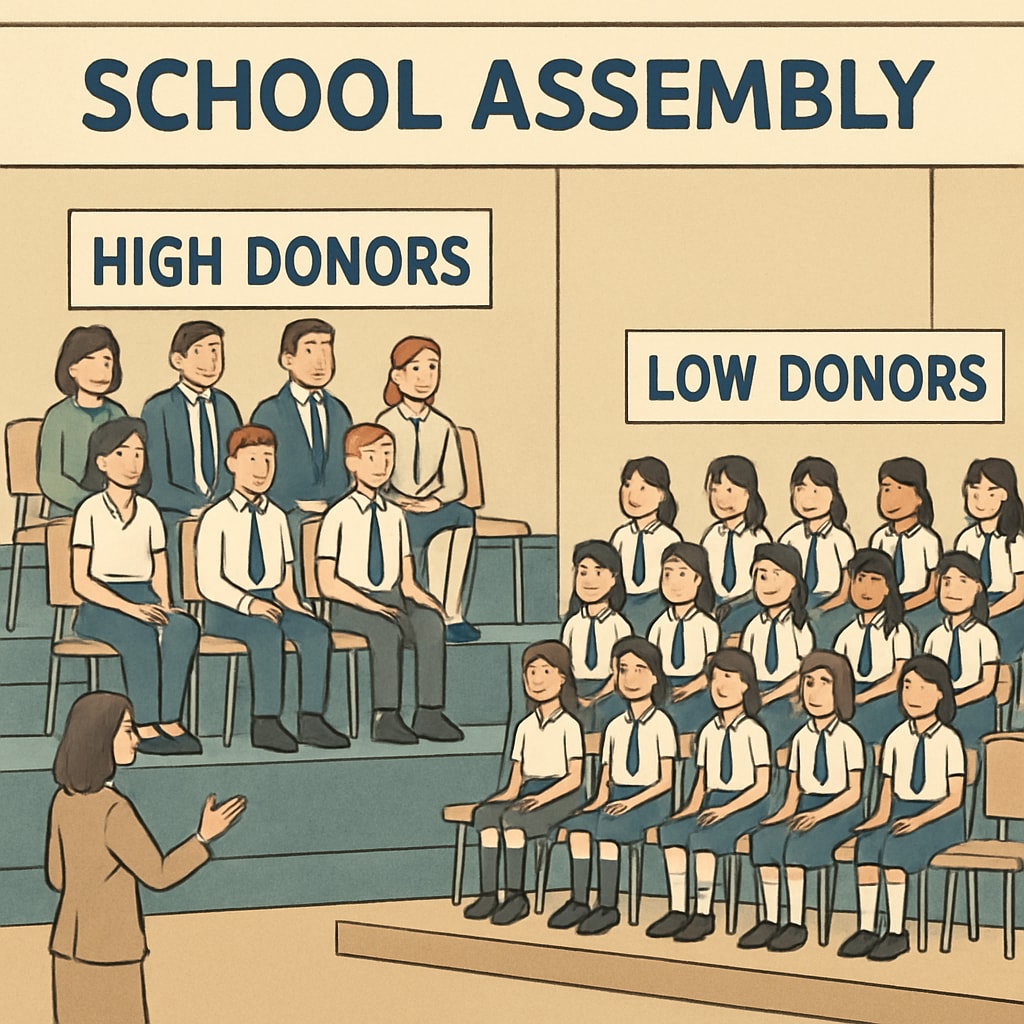School fundraising, economic discrimination, and privileged activities are becoming increasingly interconnected in modern education systems. Many schools now adopt fundraising models that reward donors with exclusive privileges based on the amount contributed. While this approach may seem effective in generating funds, it often creates invisible barriers and reinforces economic inequality among students and families. In this article, we will examine the implications of such models and explore more equitable alternatives that align with the principles of inclusivity and fairness.
The Problem with Donation-Based Privileges
Fundraising campaigns that offer rewards or exclusive activities to high-dollar donors inevitably create a division within the school community. For example, donor families might receive VIP seating at school events, exclusive access to certain extracurricular activities, or public recognition that others do not enjoy. While these incentives are designed to encourage generosity, they send a subtle yet powerful message: those with financial means are more valued within the school environment.
This approach can have far-reaching consequences. Students from less affluent families may feel marginalized or excluded, even though their parents contribute in other meaningful ways, such as volunteering time or sharing expertise. Such practices risk fostering a culture of economic discrimination that undermines the core mission of education—creating equal opportunities for all students.

Economic Inequality and Its Impact on Campus Culture
Economic disparities in schools are not new, but the introduction of pay-to-play fundraising schemes exacerbates the issue. When certain students receive enhanced experiences due to their family’s financial contributions, it reinforces existing inequalities. For instance, students whose families donated more may enjoy exclusive field trips or leadership opportunities, leaving their peers feeling undervalued.
Studies have shown that such practices can have long-term effects on children’s self-esteem and social relationships. According to research from Britannica, early exposure to inequitable treatment often leads to feelings of inferiority and reduced confidence. Moreover, the segregation of students based on economic privilege can hinder the development of a cohesive and inclusive school culture.

Inclusive Alternatives to Fundraising
Given the challenges posed by donation-based privilege systems, schools must explore fundraising models that promote inclusivity rather than division. Here are some practical alternatives:
- Community-Based Fundraising: Encourage collective efforts, such as bake sales, charity runs, or talent showcases, where every family can participate regardless of financial capacity.
- Recognition for Non-Monetary Contributions: Celebrate families who volunteer their time or skills alongside monetary donors.
- Anonymous Donations: Avoid publicizing donation amounts or offering visible rewards that highlight economic disparities.
- Equitable Access to Rewards: Make sure all students benefit equally from funds raised, such as shared experiences like school-wide events or upgraded facilities.
Schools can also work with external organizations to secure grants or sponsorships that reduce reliance on individual contributions. By implementing these strategies, institutions can prioritize inclusivity and ensure that fundraising efforts benefit the entire community.
Conclusion: A Call for Equity in Education
While fundraising is a vital component of educational institutions, it must be approached with sensitivity to avoid reinforcing economic discrimination. Rewarding donors based on the amount contributed may appear effective, but it risks creating divisions that harm the school’s social fabric. By adopting inclusive fundraising strategies, schools can ensure that every student, regardless of their family’s financial status, feels valued and supported.
Ultimately, education should serve as the great equalizer, not as a platform for perpetuating inequality. It is time for schools to rethink their fundraising models and commit to practices that uphold fairness and inclusivity for all.
Readability guidance: Use concise paragraphs and clear transitions. Incorporate examples and lists to make complex ideas more accessible. Avoid overly technical jargon while maintaining a professional tone.


